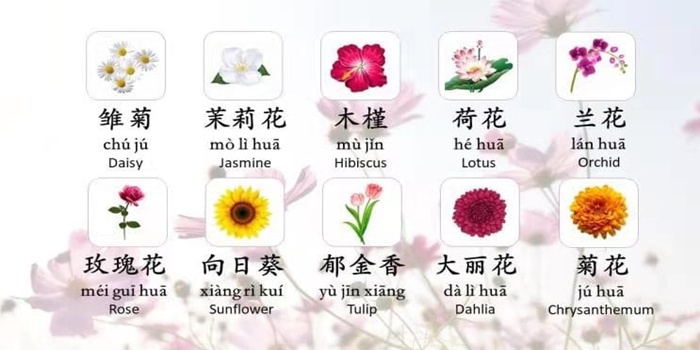
Flowers have held a special place in Chinese culture for thousands of years, symbolizing beauty, harmony, and good fortune. They are not just decorative elements but carry profound cultural and symbolic significance. In this blog, we'll delve into the top 10 flowers that have played a pivotal role in Chinese traditions, folklore, and art, enriching the tapestry of their history.
1. Peony (牡丹 - Mǔdān)
The peony is known as the "king of flowers" in China. It symbolizes wealth, prosperity, and honor. With its large, vibrant blooms, the peony represents feminine beauty and is often associated with love and affection. Peonies have deep roots in Chinese culture, and they are frequently featured in art, clothing, and even used as herbal remedies.
2. Chrysanthemum (菊花 - Júhuā)
The chrysanthemum holds a special place in the hearts of the Chinese people, symbolizing longevity and happiness. Chrysanthemums are often featured in artwork and enjoyed during the Chongyang Festival, a day to honor the elderly. The Chinese also have a deep appreciation for the chrysanthemum's various forms and colors.
3. Lotus (莲花 - Liánhuā)
The lotus is a symbol of purity and enlightenment in Chinese culture. It grows from the mud but remains untainted, representing the human ability to rise above adversity and attain enlightenment. This sacred flower is frequently depicted in religious and spiritual artwork, and it holds a significant place in Buddhism.
4. Orchid (兰花 - Lánhuā)
The orchid is celebrated for its elegance and fragrance in Chinese culture. It symbolizes nobility, integrity, and friendship. In traditional Chinese ink paintings, the orchid is a popular subject, often representing refined beauty and the scholar's ideal personality.
5. Plum Blossom (梅花 - Méihuā)
The plum blossom is revered for its ability to bloom during the winter, symbolizing resilience and perseverance. In Chinese culture, it represents strength in the face of adversity and is often used to celebrate the Chinese New Year, embodying the hope for a bright future.
6. Peach Blossom (桃花 - Táohuā)
Peach blossoms are closely associated with love and romance in Chinese culture. They are believed to bring happiness to couples and are often featured in wedding decorations. These delicate and pink blooms symbolize love and affection.
7. Lily (百合 - Bǎihé)
The lily represents purity and virtue. It is a popular flower in weddings and celebrations, symbolizing a harmonious and blissful union. Lilies are also used in funerals to pay respects to the deceased and wish them a peaceful afterlife.
8. Camellia (茶花 - Cháhuā)
Camellias are known for their beauty and durability, symbolizing longevity and faithfulness. The camellia is frequently associated with love and admiration. They come in various colors, each carrying its unique symbolism.
9. Narcissus (水仙 - Shuǐxiān)
Narcissus, often referred to as the "water fairy," is a symbol of good luck and prosperity. This flower is commonly found in Chinese homes during the Chinese New Year and other auspicious occasions. Its growth in water reinforces the idea of purity and renewal.
10. Sunflower (向日葵 - Xiàngrìkuí)
The sunflower is a relatively recent addition to Chinese culture but has gained popularity due to its positive symbolism. It represents good luck, a long life, and a bright future. The sunflower's name, "Xiàngrìkuí," translates to "turning towards the sun," symbolizing hope and optimism.
Conclusion
In Chinese culture, flowers are more than just beautiful decorations; they carry deep meanings and are an integral part of the Chinese way of life. Each of these top 10 flowers embodies different virtues and values, making them not only aesthetically pleasing but culturally significant. Understanding the symbolism behind these flowers enriches our appreciation for Chinese art, customs, and traditions. So, next time you encounter these blooms, take a moment to appreciate the profound cultural heritage they represent in the land of the Middle Kingdom.
flowers, china, flower delivery china, send flowers china, china flower delivery, flowers to china , Birthday
Celebrating St. Patrick’s Day: Traditions, Flowers, and Cakes
10 Flowers You Can Gift on International Women's Day
Five Valentine’s Traditions from Around the World
Which Gift Is Good For Valentine?
Celebrate Love with Flowersgifting’s Valentine’s Day Flower Delivery
Send Valentine’s Day Flowers Through Flowersgifting: The Ultimate Guide
What Do Red Roses Mean On Valentine's Day?
Valentine’s Day 2024 with Flowersgifting.com - Celebrate Love
The Best Flower Delivery Services in The UK: Why FlowersGifting.com is Your Top Choice
What's The Best Company For Flower Delivery In USA?
Who Is The Best Online Florist In Spain?
What Are The Traditional Flowers for Mother's Day?
Valentine's Day Flowers & Gifts Argentina
How Is Valentine's Day Celebrated In Brazil?
Best Online Flower Delivery in New Zealand
Send Valentine's Day Flowers to Canada Online with Flowersgifting
Send Valentine's Day Flowers to Germany with FlowersGifting